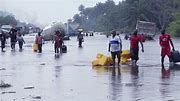For years, Amy Stelly has been a relentless force, teaming up with the Louisiana State University School of Public Health to monitor air quality near the Claiborne Expressway in New Orleans. The expressway, a bustling highway cutting through the city’s iconic French Quarter, is no stranger to heavy traffic and pollution.
At a recent community gathering, Stelly was eager to reveal data on particulate matter hotspots generated by vehicular congestion. This pollutant is linked to serious health issues like heart attacks and worsened asthma. Through her organization, the Claiborne Avenue Alliance Design Studio, she aimed to use this data to advocate for removing the expressway and bolster other local groups’ campaigns against highway expansions.
However, shortly after unveiling the data on her website at the meeting, Stelly had to take it down. A looming 2024 state law prohibited sharing air pollution data obtained from non-EPA approved technologies. Violating this law could result in substantial fines of up to $32,500 daily and an extra $1 million for intentional violations.
“It just didn’t make sense…we were violating the law by even having a meeting,”
shared Stelly about her decision to remove the data from her website.
“I can’t afford $32,500 a day…it seemed more prudent to remain quiet for a while.”
The Claiborne Avenue Alliance joined forces with other community and environmental groups in filing a lawsuit against Louisiana regulators over CAMRA—the Community Air Monitoring Reliability Act of 2024. This legislation ostensibly aimed at standardizing community-based air monitoring programs but was perceived as stifling research dissemination and infringing on free speech rights.
“It’s pretty mind-boggling,
” expressed Stelly regarding CAMRA’s impact on their work. Backed by petrochemical industry associations, CAMRA mandates that community groups must use EPA-approved methods when monitoring air pollution intended for alleging violations or noncompliance with air quality laws.
According to experts at the Environmental Integrity Project led by David Bookbinder, using expensive regulatory-grade monitors costing upwards of $791k each is impractical for many community groups aiming to fill gaps left by official monitoring sites.
“
There is no need for these groups…to spend thousands when there are affordable options available,” highlighted Bookbinder during a press conference last week.
Cynthia Roberts from Micah 6:8 Mission echoed concerns that CAMRA strangles their ability to protect public health by obstructing data sharing due to prohibitive costs and legal threats. She emphasized that not being able to share critical information due to potential financial penalties goes beyond censorship—it endangers communities’ well-being.
Despite not facing fines yet under CAMRA since its enactment last year, leaders from various community groups argue that the law hinders their vital work in areas like Cancer Alley along the Mississippi River. Caitlion Hunter from Rise St. James stressed how crucial their monitoring efforts are in such heavily industrialized regions where federal oversight falls short.
Nandan Joshi from Public Citizen Litigation Group pointed out three ways CAMRA violates free speech rights — broadly regulating allegations against polluters even informally; mandating unclear quality assurance certifications; and compelling detailed explanations alongside any pollution-related communications without clear guidelines—a significant First Amendment breach according to legal experts involved in representing these grassroots organizations against CAMRA.
Liz Murrill, Louisiana’s attorney general mentioned defending against claims of constitutional rights violation raised in response saying they would contest these assertions made by grassroots activists and legal advocates fighting back against what they see as attempts at silencing vital voices speaking out about public health risks posed by deteriorating air quality standards imposed under restrictive state laws like CAMRA.
In conclusion—this battle signifies more than just legalities clashing—it embodies resilient communities fighting for their right to safeguard public health amidst challenging circumstances imposed by stringent regulations affecting access to essential resources like clean air data.









Leave feedback about this